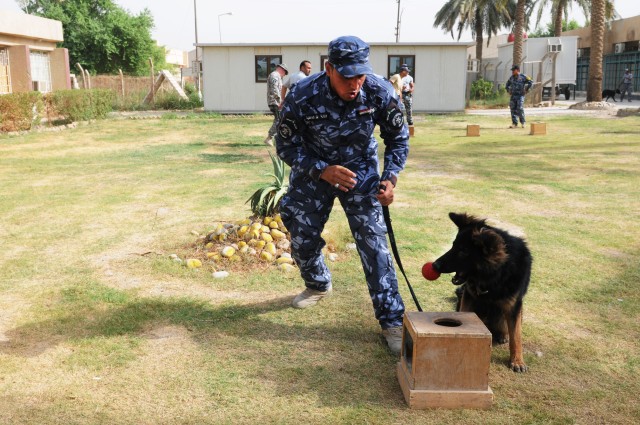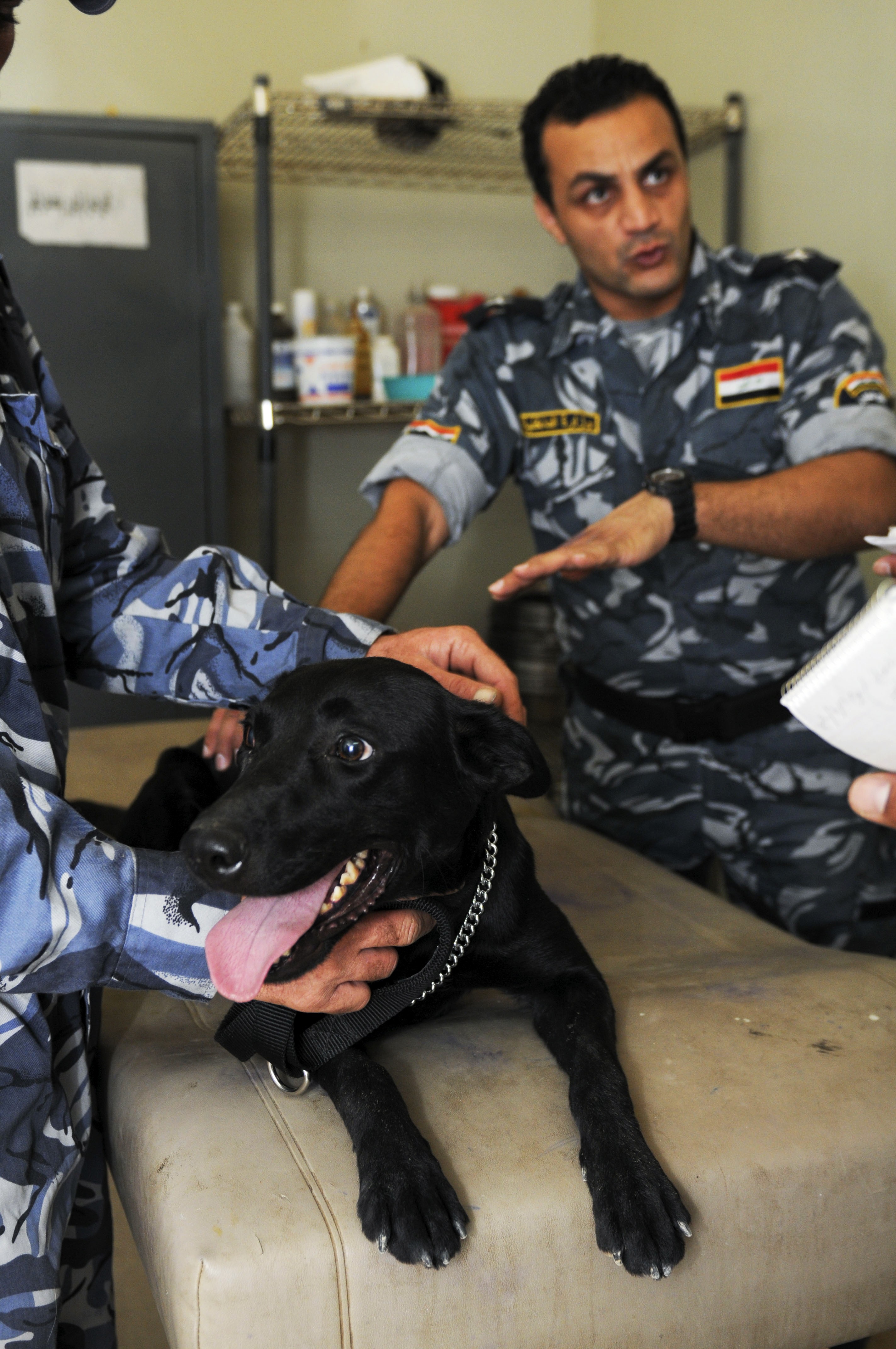BAGHDAD Aca,!" This summer an Iraqi Police explosive-detection dog sniffed out one of the largest explosives caches uncovered in Iraq.
Acting on information from Internal Affairs, the canine unit searched a farm in the southwestern province of Babylon uncovering five Katyusha rockets, three rocket-propelled grenades, two improvised-explosive devices, a kilogram of C4 explosives, and other supplies used to manufacture explosives.
This is only one of the many successful proactive operations Iraqi Police have achieved since canine units were introduced to the Iraqi Police force, said U.S. Army Capt. David Yenne, a canine advisor with Iraq Training and Advisory Mission-Ministry of Interior.
The U.S. Army began working with Iraq's Ministry of Interior Canine Directorate in September 2009 to reinstate the Iraqi Police Canine Program to educate veterinarians and their assistants on the proper care and treatment of small animals, primarily canines.
Iraq's MoI has also established a Canine Handlers School, in which Iraqi master canine trainers provide training and certify select Iraqi Police as designated explosive-detection dog handlers.
In the mid 1970s, the Baghdad Police College integrated a canine academic program, which served primarily for observation rather than instruction, said Iraqi Police Brig. Gen. Dr. Mohammed Moshb Jahr, the MoI director of canine unit.
The current canine program, however, is used to form teams consisting of canine handlers, explosive-detection dogs, veterinarians and veterinary technicians, Mohammed said. These teams are trained and then assigned to one of Iraq's 18 provinces to work at check points, patrol neighborhoods and respond to bomb threats.
Doctor Hashim Alsafi, a Baghdad native with more than 20 years experience in the veterinary field, serves as the MoI veterinary advisor and trains colleagues at the BPC Veterinary Clinic.
"Veterinarians in Iraq treat primarily large animals: cows, goats and even poultry. In recent years, veterinary schools have not been able to provide practical hands-on canine training due to the country's economic state," Alsafi said. "Now that the school falls under the MoI, the program has progressed."
Students attending the two-month course are professionals in the veterinary field, and often are MoI officers, Alsafi said. The purpose of the training is to teach basic canine anatomy and psychology of the dogs, and provide hands-on instruction. Veterinarians learn more advanced lab techniques, diagnostics and common disease prevention.
"The vets, vet assistants and handlers learn to work as a team," Alsafi said. The teams, determined by province, are composed of up to six explosive-detection dogs and six handlers, one veterinarian and two veterinarian technicians.
Throughout the course, each group monitors their explosive-detection dogs around the clock and provides a daily health assessment. The teams learn to overcome obstacles, like power outages and extreme heat. Once certified, each newly-formed team will return to their province as a canine unit.
Student and veterinary Dr. Alaa Hussein Abdul, a Karbala native and 2005 graduate of Baghdad College, learned of the canine program through colleagues at the MoI.
"We did not have a canine department at Baghdad College. I am attending the class because I heard about Dr. Alsafi's experience and I want to obtain knowledge on treating canines," Hussein said.
Police officers attending the two-month canine-handlers course must show interest in dogs and a capability to work effectively with a canine partner in a practical exercise before they are accepted into the program, Yenne said. The purpose is to evaluate the individual's ability.
"Potential students are volunteers, or selected by the provincial chief of police, and are interviewed by Brig. Gen. Mohammed as part of the selection process," Yenne said.
Yenne oversees the national canine program in Iraq. He has served in the U.S. military for 26 years, and has spent six years as a canine handler, trainer and supervisor with civilian law enforcement in his native Sacramento, Calif.
Once accepted into the course, students are monitored and have to show proficiency in their handling the explosive-detection dog, as well as keeping the dogs healthy, groomed and engaged, Yenne said.
Once teams return to their provinces, the training does not stop. They must maintain proficiency in detecting explosives. Mohammed said he personally visits kennels throughout the provinces to follow up on the graduates' progress.
Alsafi said he is also happy with the progress of the Iraqi Police Canine Program and the continued support it receives from the United States and Iraq's MoI.
The Iraqi Police Canine Program has proven to develop effective explosive-detection teams, Mohammed said. "All the provinces that have dogs are happy and are successful in finding explosives."
One difficulty Iraq's canine advisors and veterinarians work to overcome is educating the public, Alsafi said. Due to a majority of Iraqi's cultural and Islamic beliefs, dogs are considered impure. Dogs are not household pets, although they may be used as working dogs.
"Iraq needs dogs because dogs are not corrupt, not Sunni, not Shia (two major denominations of Islam)," Alsafi said. "It doesn't belong to a religious or government party. It is honest."
As time progresses, the success of the canine units becomes more evident, Alsafi said. "I am happy to use this instrument to help people; the canines save lives."
Editor's note: Alicea Valentin is a member of the Ohio Army National Guard's 196th Mobile Public Affairs Detachment attached to the U.S. Forces-Iraq Deputy Commanding General for Advising and Training Public Affairs Office.














Social Sharing